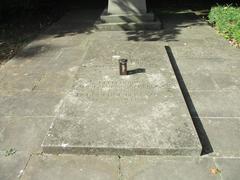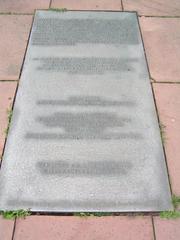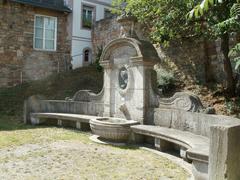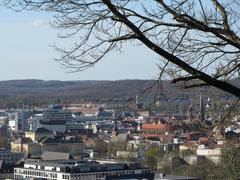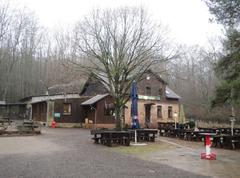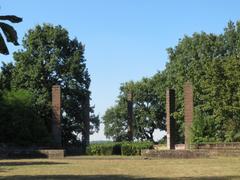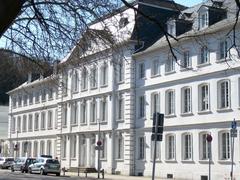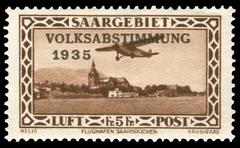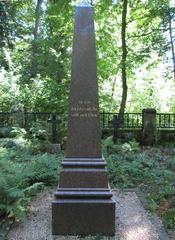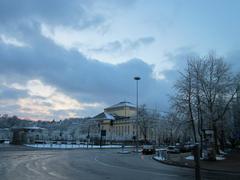Landesarchiv Saarbrücken: Visiting Hours, Tickets, and Historical Guide
Date: 15/06/2025
Introduction
The Landesarchiv Saarbrücken is the central archival institution of Saarland, located in the Scheidt district of Saarbrücken. As a vital repository of Saarland’s documentary heritage, it serves historians, genealogists, students, and anyone interested in the region’s complex political, social, and cultural past. With extensive collections ranging from medieval manuscripts to 20th-century photographs and a strong commitment to accessibility and digital innovation, the archive is an essential destination for research and cultural exploration. This guide provides up-to-date information on visiting hours, ticketing, collections, facilities, and travel tips, ensuring you make the most of your visit.
(Saarländisches Landesarchiv, Landesarchiv Saarbrücken: Visitor Guide, Historical Significance & Cultural Heritage)
Table of Contents
- Introduction
- Location, Address, and Accessibility
- Visiting Hours and Admission Tickets
- Facilities, Services, and Accessibility
- Historical and Cultural Significance
- Collections and Research Opportunities
- Visitor Experience and Practical Tips
- Nearby Saarbrücken Historical Sites
- Frequently Asked Questions (FAQ)
- Sources
Location, Address, and Accessibility
Address:
Landesarchiv Saarbrücken
Dudweilerstraße 1
66133 Saarbrücken-Scheidt
Postfach 102431
D-66024 Saarbrücken
Germany
Phone: +49 (0)681 980 39-0
Email: [email protected]
Website: Landesarchiv Saarbrücken Official Website
Getting There:
The archive is easily accessible by public transport (bus and tram connections from Saarbrücken Hauptbahnhof) and by car, with parking available nearby. The building is fully accessible for visitors with disabilities, featuring ramps, elevators, and accessible restrooms.
(source)
Visiting Hours and Admission Tickets
Opening Hours:
- Monday to Friday: 8:30 am – 4:00 pm
- Closed on weekends and public holidays
(source)
Admission Fees:
- Day pass: €2.50
- Weekly pass: €10.50
- Monthly pass: €25.00
These fees grant access to the reading room and archival materials. Research and consultation services are free.
(source)
Registration:
All visitors must register at the entrance. Pre-registration via email is highly recommended, especially for first-time visitors or those with specific research needs.
Facilities, Services, and Accessibility
Reading Rooms and Research Support
- Quiet, well-equipped reading rooms with access to original documents, microfilms, and digital resources.
- Microfilm readers, computers with online catalog access, and free Wi-Fi.
- Lockers for personal belongings (bags not allowed in reading rooms).
- Expert staff available for research guidance and genealogical support.
Digital Access and Online Resources
- Many holdings are digitized, including high-resolution glass plate negatives of the 1935 Saar plebiscite and wartime community surveys.
- Online finding aids and searchable databases are accessible via the archive’s website.
- Cooperation with the Deutsche Digitale Bibliothek expands digital reach.
Accessibility
- The archive is fully accessible (ramps, elevators, accessible restrooms).
- Braille brochures and additional formats available; contact staff in advance for special requirements.
Amenities
- Restrooms and cloakrooms onsite.
- Vending machines for drinks/snacks; numerous cafés and restaurants in the vicinity.
Historical and Cultural Significance
Established in 1948, the Landesarchiv Saarbrücken safeguards Saarland’s documentary legacy, reflecting its unique Franco-German history and pivotal moments like the Saar plebiscites and the region’s integration into Germany. The archive’s collections are critical for understanding not only Saarland’s past but also broader themes of European history, borderland identities, and postwar reconstruction.
The archive plays an active role in public engagement, hosting events, exhibitions, and educational workshops, and collaborating with local universities and historical societies.
(source)
Collections and Research Opportunities
Scope of Collections
- Government, administrative, and court records from the 12th century to the present.
- Photographic archives, including nearly 500 glass plate negatives from the 1935 Saar plebiscite.
- Wartime documents: community surveys, air raid records, and maps.
- Genealogical sources: civil registers, church books, notarial records, and property documents.
- Special collections: personal papers, business archives, and thematic collections (e.g., gastronomy, health history).
Digital and Remote Research
- Extensive digitized collections available online (online database).
- Remote document retrieval and copying services (fees may apply).
Visitor Experience and Practical Tips
Preparation:
- Research materials in advance using online finding aids and prepare a document list.
- Bring valid photo ID for registration.
- Most materials and communication are in German; some staff speak English.
In the Archive:
- Use only pencils; gloves provided for handling fragile items.
- Personal photography permitted (no flash/tripods; staff approval required).
- Silence is expected in reading areas.
Additional Tips:
- Arrive punctually, especially if you have an appointment.
- No food/drink in reading rooms.
- Guided tours are offered occasionally—check the website for announcements.
Fees:
- Research and consultation: free
- Reading room access: €2.50/day, €10.50/week, €25.00/month
- Copies and reproductions: variable fees; payment by cash or card (source)
Nearby Saarbrücken Historical Sites
- Saarbrücken Castle: Museums and tours.
- Ludwigskirche: Baroque church, iconic city landmark.
- Völklinger Hütte: UNESCO World Heritage industrial site.
- St. Johanner Markt: Pedestrian market square with restaurants and shops.
For more, see Saarbrücken tourism portal and The Crazy Tourist Saarbrücken Guide.
Frequently Asked Questions (FAQ)
Q: What are the visiting hours?
A: Monday–Friday, 8:30 am–4:00 pm; closed weekends and public holidays.
Q: How do I access the reading room?
A: Purchase a day/week/month pass at the entrance; registration required.
Q: Is the archive accessible for wheelchair users?
A: Yes, ramps, elevators, and accessible restrooms are available.
Q: Can I take photographs of documents?
A: With staff approval; no flash or tripods.
Q: Are guided tours available?
A: Occasionally during special events—check the official website.
Q: Is there an onsite café?
A: No, but there are vending machines and nearby cafés in Saarbrücken-Scheidt.
Q: Where can I find more information?
A: Visit the official website.
Sources
- Landesarchiv Saarbrücken: Geschichte, Besuchsinformationen & Highlights für Besucher
- Landesarchiv Saarbrücken: Visitor Guide, Historical Significance & Cultural Heritage
- Landesarchiv Saarbrücken Visiting Hours, Tickets, and Visitor Guide
- Visiting Landesarchiv Saarbrücken: Hours, Tickets, and Comprehensive Visitor Guide
- Archivtag Hypotheses Blog
- Saarbrücken tourism portal
- The Crazy Tourist Saarbrücken Guide
Final Tips
For the latest updates on opening hours, health regulations, and special events, always check the Landesarchiv Saarbrücken Official Website. Enhance your visit with the Audiala app for interactive tours and cultural content.
Whether you’re conducting academic research, exploring your family’s past, or immersing yourself in Saarland’s vibrant history, the Landesarchiv Saarbrücken offers a welcoming and resource-rich environment. Combine your visit with other local attractions for a comprehensive cultural experience.
